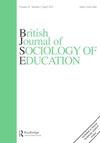Shaping personal worldviews when neo-liberalism meets Confucianism and patriotism: insights from Chinese postgraduate students
IF 2.1
3区 教育学
Q1 EDUCATION & EDUCATIONAL RESEARCH
引用次数: 0
Abstract
Abstract This study examines how Chinese postgraduate students’ personal worldviews are separately and collectively shaped by the interplay of neoliberalism, Confucianism and patriotism. The findings reveal that neoliberalism contributes to Chinese postgraduates’ enterprising self by shaping their subjectivity in pursuing personal goals, influencing their thinking with the market logics of efficiency, effectiveness and quantifiable outcomes, and leaving them with a predisposition toward deregulation. Confucianism prompts the postgraduates to self-strengthen at the individual level and guides them with interaction norms at the interpersonal level. Patriotism underpins the postgraduates’ psychological and emotional power based on strengthened memories of historical events and pride in national achievements, thereby generating a deep-seated collective identity. Counteracting and consolidating forces are identified based on the interplay of the three isms, resulting in the Chinese postgraduates’ partial individualization. The partial individualization reflected in today’s Chinese postgraduates features a consistent rather than divisible dual-self.新自由主义与儒家思想和爱国主义相遇时个人世界观的塑造:来自中国研究生的见解
摘要本研究考察了新自由主义、儒家思想和爱国主义三者的相互作用如何分别和共同塑造了中国研究生的个人世界观。研究发现,新自由主义塑造了中国研究生追求个人目标的主体性,影响了他们对效率、有效性和可量化结果的市场逻辑的思考,并使他们倾向于放松管制,从而有助于中国研究生的创业自我。儒家思想在个体层面促使研究生自我强化,在人际层面以互动规范指导研究生。爱国主义基于对历史事件的强烈记忆和对国家成就的自豪感,巩固了研究生的心理和情感力量,从而产生了一种根深蒂固的集体认同。在这三种主义相互作用的基础上,确定了抵消和巩固的力量,导致了中国研究生的部分个性化。当今中国研究生所表现出的部分个体化特征是一种一致而非可分的双重自我。
本文章由计算机程序翻译,如有差异,请以英文原文为准。
求助全文
约1分钟内获得全文
求助全文
来源期刊
CiteScore
3.70
自引率
9.50%
发文量
74
期刊介绍:
British Journal of Sociology of Education is one of the most renowned international scholarly journals in the field. The journal publishes high quality original, theoretically informed analyses of the relationship between education and society, and has an outstanding record of addressing major global debates about the social significance and impact of educational policy, provision, processes and practice in many countries around the world. The journal engages with a diverse range of contemporary and emergent social theories along with a wide range of methodological approaches. Articles investigate the discursive politics of education, social stratification and mobility, the social dimensions of all aspects of pedagogy and the curriculum, and the experiences of all those involved, from the most privileged to the most disadvantaged. The vitality of the journal is sustained by its commitment to offer independent, critical evaluations of the ways in which education interfaces with local, national, regional and global developments, contexts and agendas in all phases of formal and informal education. Contributions are expected to take into account the wide international readership of British Journal of Sociology of Education, and exhibit knowledge of previously published articles in the field. Submissions should be well located within sociological theory, and should not only be rigorous and reflexive methodologically, but also offer original insights to educational problems and or perspectives.

 求助内容:
求助内容: 应助结果提醒方式:
应助结果提醒方式:


